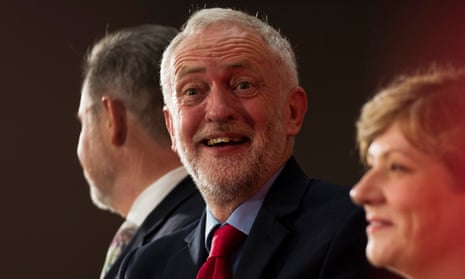Q: How would it work? You would talk to Corbyn?
Sturgeon says if this is what happens, it is what the electorate want. They would want parties to talk to each other.
But she repeats her point about how she thinks this is unlikely.
All the day’s campaign news, as the Conservative and Labour leaders appear on BBC1’s Question Time and the Guardian comes out for Labour
Q: How would it work? You would talk to Corbyn?
Sturgeon says if this is what happens, it is what the electorate want. They would want parties to talk to each other.
But she repeats her point about how she thinks this is unlikely.

Good morning. I’m taking over from Claire.
Nick Robinson is interviewing Nicola Sturgeon, the Scottish first minister, on the Today programme.
Q: Will you help Labour get into power if they are the largest party?
Sturgeon says if there is a hung parliament, she would want the SNP to be part of a progressive alternative to a Conservative government, but not as part of a coalition.
Q: How would that work? Would you have talks with Jeremy Corbyn and agree to vote for certain things?
Sturgeon says she would look at things on an issue by issue basis.
If that were to arise, the electorate would have decided it does not want either of the two big parties to govern with a free hand.
But she is “sceptical”, she says. She sees a narrowing of the polls. But Theresa May and the Tories are still on track to win. But they might not get a bigger majority.
That means Scotland is more important, she says.

Andrew Sparrow is now taking the live blog reins.
If you’d like to receive the Snap, our daily election email briefing, do sign up here. You can read today’s here.
The Brexit secretary’s comments came yesterday evening on BBC Question Time (the regular version; the special edition featuring May and Corbyn, separately, screens this evening).
Earlier on Thursday, policing minister Brandon Lewis said that cutting net migration to the tens of thousands – included in the manifesto – should happen “over the course of the next parliament”. That’s 2022, presuming we get a five-year parliament next time round.
The prime minister, quizzed about Lewis’s comment, agreed:
That’s what we’re working for.
But David Davis, on Question Time, seemed to row back from the 2022 goal:
That wasn’t actually in the manifesto, it was ‘we will bring it down’, we didn’t say, we didn’t put a date.
We would like to do it in the parliament, but I think, you know, it will be dictated by a number of things.
The economy, the speed with which we can get our own people trained up to take the jobs, the changes in the welfare to encourage people to work.
A whole series of things which were designed to ensure this is an economically successful policy.
[It’s] the aim, yes, but we can’t promise within five years, that’s the point.
At the launch of the Scottish Conservative manifesto, Davidson said she would not disagree with a questioner who asked if she thought May should not be held to ransom by “Brexiteer bastards”.
Today she says:
I wouldn’t use that language in public, maybe in private …
She says she thinks it is important for the prime minister to have the space within the House of Commons to negotiate Brexit “without having to be held to ransom by either side of the aisle”.
May needs to have “maximum manoeuvrability”, Davidson adds.
That would appear to go for the issue of net migration, too, on which Davidson – who campaigned for remain – says not much that diverges from the official Tory line:
The policy is to bring down net migration to the tens of thousands.
On that commitment to remain, she says it was right to change her mind, adding that SNP leader Nicola Sturgeon “said she would respect the result [of the independence referendum] and she hasn’t … it would not be right and proper” not to respect the EU referendum result.
That’s it. But Davidson will earn a bonus point at CCHQ for her mention of “Theresa May and her team”.
Ruth Davidson, the Scottish Conservative leader, has been speaking to Radio 4.
She denies the Tory campaign is in trouble, despite some squeaky polls:
We’re in the mid-40s … which is higher than even Tony Blair got in his 1997 landslide.
She says Labour’s poll climb is more to do with what she calls the “disastrous Lib Dem campaign”. It’s the media’s job to say the polls have narrowed as an election nears, she says.
I haven’t seen an election yet - and I’ve fought six of them as leader plus two referenda - where it hasn’t been the media’s job to start creating expectation about the result by saying that the polls have narrowed and, funnily enough, two weeks out, they started that narrative, and it is continuing through to polling day.
I think that people that have the experience need to hold their nerve, put your head down, keep working, because there is no substitute in an election for hard work.
She is pressed on the issue of pensioners’ winter fuel allowance, which Theresa May’s manifesto said would be means-tested – but not in Scotland. Davidson insists this is fair:
The issue is a devolved issue … in Scotland we have a different social care model … I’ve decided that we won’t means-test that … Politics is about hard choices: this is the choice I chose to make.
I think this is a universal benefit that people have always relied on … This is an area that I personally do not want to see means-tested.
Her “colleagues down south” made a decision to spend the money elsewhere, she says.


Len McCluskey, one of Jeremy Corbyn’s closest allies and leader of Britain’s biggest union, is facing claims that his re-election in April should be declared void because of multiple rule breaches.
Gerard Coyne, who lost the leadership election by less than 6,000 votes, will ask the certification officer on Friday to investigate whether the leader of Unite and his staff manipulated the union’s procedures to win the poll.
McCluskey’s support has been seen as vital to maintaining Corbyn’s leadership of Labour over two years of challenges from senior MPs.
Documents show that alleged rule breaches include allowing McCluskey to use databases while stopping Coyne from doing the same during the campaign to become general secretary; union employees actively seeking to prevent Coyne raising the legitimate question as to whether Union resources were improperly used to assist with the purchase of a luxury flat; and repeated harassment of Coyne and his supporters by union employees.
A Unite spokesman said the union rejected the allegations, which come at a critical moment for the Labour movement as the Conservatives struggle in their election campaign.
Andrew Murray, Unite’s chief of staff, could be called upon to offer evidence to any inquiry. He has been seconded to Corbyn’s general election campaign.
Theresa May’s low-key response to the decision by Donald Trump to pull the US out of the Paris climate agreement has prompted some angry retorts.
May did not put her name to a strong statement issued by her counterparts in Germany, France and Italy; instead Downing Street said late on Thursday that the prime minister was feeling “disappointment”:
President Trump called the prime minister this evening to discuss his decision to pull the US out of the Paris agreement.
The prime minister expressed her disappointment with the decision and stressed that the UK remained committed to the Paris agreement, as she set out recently at the G7.
She said that the Paris agreement provides the right global framework for protecting the prosperity and security of future generations, while keeping energy affordable and secure for our citizens and businesses.
Other party leaders were not impressed:
Pulling out of the #ParisClimateDeal is reckless and regressive. Instead of handholding, I'll work for a sustainable future for our planet. pic.twitter.com/ONKUMZQmzm
— Jeremy Corbyn (@jeremycorbyn) June 1, 2017
Appalling abdication of leadership by the PM. https://t.co/QJ3Eyjru7t
— Nicola Sturgeon (@NicolaSturgeon) June 1, 2017
If the special relationship between the PM and Trump exists, it exists for moments like this.We need to make him see sense on climate change
— Tim Farron (@timfarron) June 1, 2017
We are the climate movement.
— Caroline Lucas (@CarolineLucas) June 1, 2017
We will not be stopped by #Trump.
We are stronger.
We will win.#ParisAgreement #Climate
Willie Rennie, leader of the Scottish Lib Dems, has been speaking to the Today programme.
The party is hoping for a bounce-back from its 2015 performance, which saw it lose all its seats in Scotland, bar Alistair Carmichael’s in Orkney and Shetland.
Rennie says it’s not a contradiction for the party to oppose a second referendum on Scottish independence but also call for a second referendum on a Brexit deal:
On Brexit we think it’s such a monumental issue … people should have the right to reject a bad deal.
In Scotland we rejected a bad deal three years ago.
You can’t possibly have another independence referendum all the time.
Independence, he says, is “already rejected”; with Brexit, there is still a “need to conclude the process”.
As Tim Farron has said of the UK-wide party, Rennie confirms that the Lib Dems would not enter a coalition with Theresa May or Jeremy Corbyn as prime minister – because of Brexit.
No, we’re out …
We couldn’t possibly … do a deal with either of them.
We’ll do it vote by vote to get a better deal on Brexit.

Welcome back to the final Friday of campaigning. By this time next week everything will be, if not over, at least clearer. Ish. I’m Claire Phipps with your morning roundup; the live blog will steer you through the rest of the day.
Manifestos are a funny thing: we assume most voters don’t read them, but we like to think that the politicians haggling for our votes have. This is also why we like them to get their numbers right, or not to pretend that a howling U-turn was there all along. It’s also why, when a senior government minister contradicts the PM within hours on a key manifesto ingredient, those whose job it is to condense daily politics news into a handy morning briefing can get a bit tetchy.
The Conservative commitment-turned-pledge-turned-aspiration to cut net immigration to the tens of thousands made it into the manifesto for the third time, despite never sighting success. Yesterday, Theresa May teetered perilously close to making it a commitment again, agreeing with policing minister Brandon Lewis that it should happen “over the course of the next parliament”.
“That’s what we’re working for,” May confirmed.
But on BBC Question Time hours later, the Brexit secretary David Davis wasn’t so sure:
That wasn’t actually in the manifesto, it was ‘we will bring it down’, we didn’t say, we didn’t put a date … [It’s] the aim, yes, but we can’t promise within five years, that’s the point.
Five years is a long time in politics, especially when May is, she told us yesterday, “just focused on polling day”. (You thought she was just focused on Brexit negotiations? That was the day before yesterday.) Perhaps that’s why the PM did not join her French, German and Italian counterparts in their statement scolding Donald Trump’s decision to crumple up the US copy of the Paris climate agreement and lob it in the non-recyclables bin. Downing Street later said May had voiced her “disappointment” to the US president, as Nicola Sturgeon accused her of an “appalling abdication of leadership” and Labour’s Emily Thornberry claimed she had “failed to raise even the quietest peep in protest”.

With both May and Jeremy Corbyn making speeches on a post-EU UK yesterday, we now have a misty idea of what Brexit means, and it’s either terrible or completely brilliant, and don’t trouble yourself too much with the knotty details. The PM set out her 12-point plan for a brighter Brexit, which stretched the definition of plan with “points” including:
(Don’t @ me: the other eight bullet points do appear in the plan, although that would have been a forgotten numbers gaffe to make a fuss about.)
While this sets the Tories apart from parties pledging uncertainty, obfuscation and an unruly stampede to the emergency brexits, it does still leave a few questions unanswered. Such as: yes, but what are you actually going to do?
Could Labour be more specific? Shadow Brexit secretary Keir Starmer said they wouldn’t be putting a figure on migration. Corbyn confirmed that – unlike the “no deal is better than a bad deal” PM – he wouldn’t walk away without … something:
There is no such thing as no deal. No deal is in fact a bad deal; it is the worst of all deals.
Tim Farron, the latest leader to face the BBC’s Andrew Neil, knew what deal he wanted, and it sounded rather like being a member of the EU:
I cannot see any chance of us getting a better deal than the one we have now.
With Neil labelling the Lib Dem leader “a Eurosceptic remoaner” and “a populist who’s not popular”, and May telling us that Corbyn “doesn’t believe in Britain” (whenever a politician says “I don’t believe in Britain” there’s a little cup of tea somewhere that goes tepid), is there any respite from final-week jibes? Even the Economist, while endorsing the Lib Dems, called it “a dismal choice” and predicts “a dreadful result” for its chosen party.
All round for a jam sandwich at Corbyn’s house then, where, he told journalists yesterday, even his own party critics would be welcome:
I do a lot of group hugs with lots of people. I love a group hug.
Cosying up would be Bernie Sanders, who last night told an audience at the Brighton festival that Corbyn had his backing.
Not included in the embrace? The SNP, Lib Dems, Greens or any other party that might be angling for an alliance in the event of a hung parliament. Corbyn and Thornberry said there would be “no deals, no coalitions, no pacts” under a Labour minority administration. Or possibly no anything, under Thornberry’s plan:
If we end up in a position where we are in a minority, then we will go ahead and put forward a Queen’s speech and a budget and, if people want to vote for it, then good, but if people don’t want to vote for it, then they are going to have to go back and speak to their constituents and explain to them why we have a Tory government instead.
Today we’re gearing up for another bout of May v Corbyn that doesn’t involve May or Corbyn clapping eyes on each other. Each will step up separately with David Dimbleby for a BBC Question Time special. But first, the PM will be making sure she doesn’t fluff her figures on Woman’s Hour by remembering her figures – no, sorry, by not showing us the costings for her manifesto and sending education secretary Justine Greening to Radio 4 instead.
At a glance:
How’s that Tory revival looking in Wales? According to a fresh poll by YouGov for ITV and Cardiff University – and in keeping with other recent YouGov results – not as rosy as it was. April saw the Tories top Labour by 40% to 30%, though that had reversed by mid-May. Yesterday’s poll keeps Labour ahead, 46% to 35%, a projection that could see them swipe back two seats – Gower and the Vale of Clwyd – from the Conservatives. This, as with other polls showing the Tories on a shakier footing, relies on ample young voters turning out.
Plaid Cymru, the Lib Dems and Ukip would stay as they were, on this projection, with respectively three seats, one and zero.
No surprise in the Evening Standard poll by the ever-busy YouGov that puts Labour on 50% over the Tories on 33% in London. But for the first time, the capital’s voters rated Corbyn (37%) over May (34%) as the best candidate for PM.

If the PM does not get the landslide she was hoping for in calling a snap election, what, asks Mary Dejevsky in the Independent, might this mean for Brexit?
What would it mean that a prime minister who went to the country seeking an explicit parliamentary mandate for Brexit had essentially been rebuffed? (And this would surely be the significance of anything less than a clearly increased majority.) As seen from Brussels – or Berlin or Paris – the British bargaining position would be substantially weakened. The government’s mandate would be a lot less convincing than it would have been without a vote. How would any UK prime minister then proceed?
One consequence could be that the initiative passes from the government to parliament. Given that the election post-dated the referendum, a slim victory for May (or less) could encourage those many MPs with misgivings about Brexit to take another look at the ‘will of the people’. They could well argue that now an election had been fought on Brexit – after all, this is what Theresa May intended, even though many other issues came to cloud the vote – the ‘will of the people’ was rather less clear.
We’ve all heard the Corbyn cheerleaders. But there are shy Corbynites too, writes Rhiannon Lucy Cosslett in the Guardian:
I had become so used to political commentators popping up every time I expressed admiration for Corbyn’s principles to call me naive or a narcissist or an Islington-dwelling champagne socialist or a loony lefty, as though we were in some pompous game of whack-a-mole, that I began to sort of believe it. But I never did stop believing in the same things Corbyn does – in equality, social justice, social mobility and peace. Nor did I ever doubt that families such as my own would be much better off under a Labour government than a Tory one. Which is why I’m going to vote for him again.
One for those who like to plan ahead for results night (welcome; I have found my people): Press Association’s estimated declaration times for each constituency.
. @afneil "Has there been a worse Tory campaign in living memory?" @michaelgove "Yes, my one for the leadership" #bbctw
— Sophy Ridge (@SophyRidgeSky) June 1, 2017
Would you like to wake up to this briefing in your inbox every weekday? Sign up here!
Comments (…)
Sign in or create your Guardian account to join the discussion